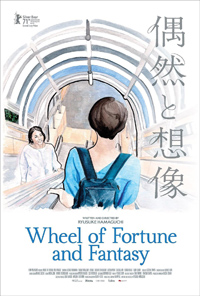Flesh+Fantasy: Hamaguchi Harvests Regrets in Eloquent Triptych
 One of Japan’s most compelling and profound contemporary auteurs is Ryusuke Hamaguchi, a purveyor of the barely contained emotions roiling beneath life’s facades. His specialty leans towards women who are forced to somehow reckon with the nagging certainty of something being off or ultimately undesirable in lives otherwise stable and well-heeled.
One of Japan’s most compelling and profound contemporary auteurs is Ryusuke Hamaguchi, a purveyor of the barely contained emotions roiling beneath life’s facades. His specialty leans towards women who are forced to somehow reckon with the nagging certainty of something being off or ultimately undesirable in lives otherwise stable and well-heeled.
Hamaguchi’s 2015 breakout hit, the five-hour plus Happy Hour was an ambitiously insular spectacle about four women, and 2018’s Asako I & II contends with a woman mired in a situation regarding identical lovers. His latest, Wheel of Fortune and Fantasy is a triptych of tales somewhere between these continuums of maudlin melodrama and distilled desires compounded by regrets and suspicious agendas. Superbly realized and surprisingly blunt, it’s an exercise on whether or not we can grow or change considering how parts of us remain the same, ensconced in memories which define and haunt crucial moments.
Increasingly, Hamaguchi’s output bears a similarity in tone to the cerebral sci-fi of Kiyoshi Kurosawa (so it’s no surprise Hamaguchi wrote the script for Kurosawa’s lauded 2020 title Wife of a Spy), and there’s a sinister edge to Wheel of Fortune and Fantasy which is equal parts romantic nostalgia and sexually obsessive. A past toxic relationship becomes triangulated in the film’s first segment “Magic (or Something Less Assuring)” and plays more with fantasy given Meiko’s (Kotone Furukawa) extrapolations of how she chooses to handle the situation of her best friend dating an ex-boyfriend she harbors mixed feelings for. The second episode, “Door Wide Open” is a strangely titillating dance about a mother (Katuski Mori) goaded into honey trapping a prolific professor (Kiyohiko Shibukawa) who demeaned the lackluster younger man she’s been seeing outside of her marriage only to jumpstart what sounds like a more titillating adulterous option with a man who’s penned a successful erotic novel. Their eventual desires, funneled through the writing of and reading aloud of his erotic prose, has all the promise of a Nagisa Oshima enterprise before a silly mistake destroys both their livelihoods.
Finally, perhaps the most meaningful exchange occurs in Episode 3, “Once Again.” A mysterious digital virus has rendered electronic communication temporarily unavailable, forcing people to interact via written correspondence. Moka (Fusako Urabe), a computer engineer, is unemployed thanks to current events, and with her new free time decides to attend her twenty-hear high school reunion. Standoffish and unenthusiastic, she’s about to take the train home the next morning when she runs into Nana (Aoba Kawai), who she believes to be the classmate she was looking to find at the reunion. They return to Nana’s home, who is awaiting delivery of a package for her teenage son, and the two women reminisce. Eventually, it appears Nana has no memory of Moka, and the attraction at the train station they acted upon is instead a complex mixture of memories, repressed desires, and the need for a connection neither of them have. Pressed about her life, Nana tells Moka, “Objectively speaking, I’m happy.” But as their conversation goes on, including with a touching role play for Moka’s benefit, she reveals “Time is slowly killing me. I’m not passionate about anything anymore.” And it’s a line which could have been uttered by any one of the characters across these three scenarios, hurtling along on life’s fast track but forever returning to the memory of defining junctures. In every sequence, it’s remarked how someone looks the same, unchanged perhaps because some kind of cosmic energy has trapped them in a time or a moment where they wish or believe events should have transpired differently. Wheel of Fortune and Fantasy is another aching, beautiful film from Hamaguchi, and plays like the visualization of an obscure literary collection begging for rediscovery.
Reviewed on March 4th at the 2021 (virtual edition) Berlin International Film Festival – Main Competition. 121 Mins.
★★★★/☆☆☆☆☆


